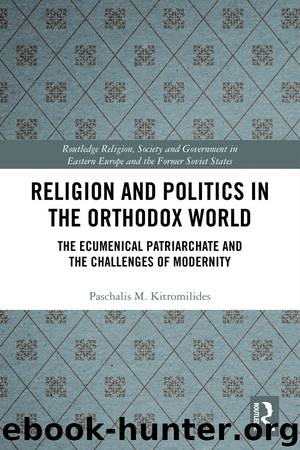Religion and Politics in the Orthodox World by Paschalis Kitromilides

Author:Paschalis Kitromilides
Language: eng
Format: epub
Publisher: Taylor & Francis (CAM)
4 The end of empire, Greece’s Asia Minor catastrophe and the Ecumenical Patriarchate
In the history of the Ecumenical Patriarchate, the Great Church of Christ in Constantinople, the first quarter of the twentieth century, the period from 1900 and 1925, could be considered in a broader interpretative perspective to illustrate in the life of the Church militant Aristotle’s definition of tragedy. More precisely this story could be viewed as a reenactment in real historical life of Aristotle’s remark on the radical reversal of human fortunes which he includes in the definition of tragedy using the concept of περιπέτεια: a reversal, a change of the situation into the opposite (ἡ εἰς τὸ ἐναντίον τῶν πραττομένων μεταβολή).1 Indeed, if we were to compare the condition of the Church of Constantinople in the year 1900 or 1901, when Patriarch Joachim III returned to the throne for his second patriarchate (1901–1912), with what was left of the Great Church of Christ just a quarter of a century later, we will be able to see exactly how the fortunes of Orthodox Christianity in Turkey in the period in question reenact the tragic essence of Aristotle’s concept of περιπέτεια.
These momentous developments in the life of the Church of Constantinople constituted an integral component of the epoch-making transformation marking the history of Europe and the Near East during the first quarter of the twentieth century: the transformation followed the convulsions brought about by world war and revolution, the end of the great multi-ethnic and multinational empires and the advent of the modern state system in that part of the world. The Ottoman Empire, whose presence had been receding in Europe since the early nineteenth century, reached its definitive end with defeat in the Great War and the overthrow of the imperial institution by the Turkish revolution that gave birth to the Turkish Republic. These revolutionary changes affected deeply the fate of the several Christian minorities in Turkey, their churches and ecclesiastical institutions. The most dramatic consequences were reserved for the principal Christian communion in Turkey, which in fact had been represented by the oldest institution with continuous existence of almost two millennia in the country, the Church of Constantinople.
Download
This site does not store any files on its server. We only index and link to content provided by other sites. Please contact the content providers to delete copyright contents if any and email us, we'll remove relevant links or contents immediately.
